The long-anticipated, centre-of-racist-controversy live-action remake of The Little Mermaid is finally out, and it’s by far the best live action remake of Disney’s animated classics! Halle Bailey is a serial scene-stealer. Her impressive vocal abilities deliver in the new renditions of the classic songs and her emotionally rich performance as Ariel is magical. I’m so glad the film went for a colour-blind casting because Bailey seems to have been born to play Ariel. From floating with her underwater neighbours and swimming rapidly away from sharks to unsurely stumbling forward on her feet into a dance and trying to communicate without talking, Halle expertly captures all the facets of Ariel.
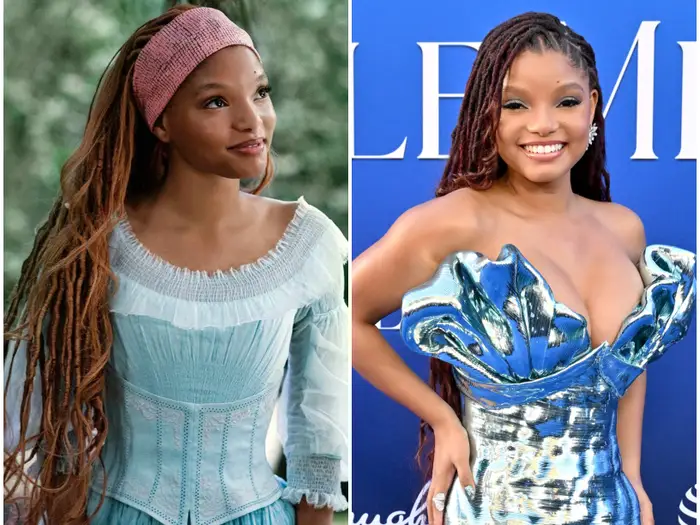
Her musical performances deserve critical acclaim. It is often difficult for a cover of a song to induce the same feelings in a viewer as the original, however, Halle’s vocals in ‘Part of Your World’ could bring you to tears just like the original. Her voice is the reason why the modifications to the songs feel authentic and natural. Lin Manuel-Miranda oversaw the musical modifications and as an ardent fan, it pains me to be critical, but there were some questionable artistic choices. The new music is more of an update, not necessarily expanding on the original soundtrack and score from the animated classic. The only new addition is a “rap” song featuring Aquafina which I’m sure parents will find to be a headache once their children have over-played it.
The supporting cast does a great job also, fleshing out the world in their own ways. Daveed Diggs as Sebastian and Aquafina as Scuttle both give incredibly enthusiastic performances as always, and the quirkiness of the original characters translates well even in live-action. But one character stands out when it comes to translation of characterization, giving Halle Bailey’s Ariel stiff competition. She’s none other than Melissa McCarthy as the fan-favourite Ursula!
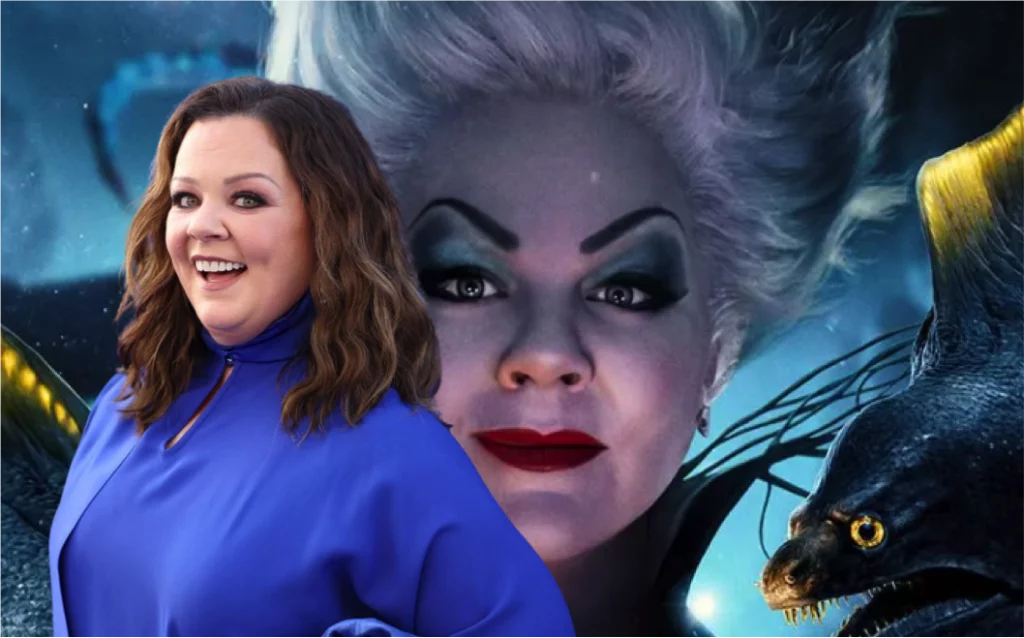
Before I go on to explore why I love her portrayal and why I’m disappointed Ursula’s story is the same as it was in the original, let’s take a deeper dive into what Ursula represents. The first thing we find out about Ursula in the original The Little Mermaid is that she’s a witch. She has been exiled by her brother, King Triton, because she has evil intentions and steals people’s voices for her own personal use. When you strip away the evil overlay necessary for a Disney villain, you have a performer donning different personas. Being a performer is inherent to Ursula, as she was based on frequent John Waters collaborator, the Drag Queen Divine. She was one of the most popular personalities in drag back in the 70s, having roles in films like Female Trouble and Pink Flamingos.
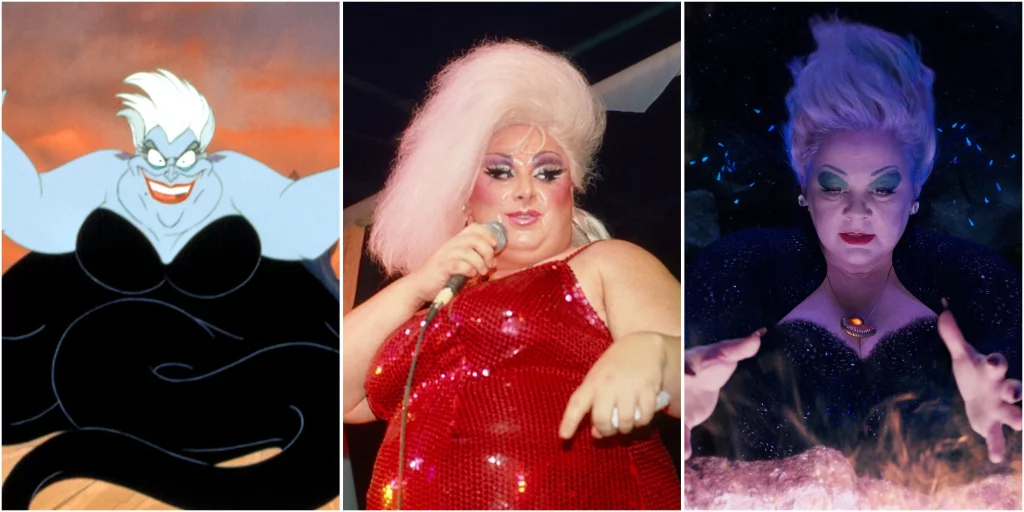
Back when the animated adaptation of Andersen’s story was created by Disney, there was merely some speculation on Ursula’s origins. Her flamboyant yet dark fashion aesthetic, the exaggerated behavioral antics, and the over-the-top makeup did seem to suggest that there was some inspiration drawn from Drag performance, but Disney never officially confirmed it. Ursula was thus added to the endless list of queer-coded Disney villains who exist as reminders of Disney’s tryst with questionable representation. But today, it’s officially known that Ursula’s look is based on Divine, and it was coding only in the sense that Disney never confirmed it.
Whatever my misgivings about Ursula’s storyline in the old and new films, Melissa McCarthy has knocked it out of the park with her performance. Having a history of performing drag herself under the name of Miss Y, she felt connected to the character, and put in extensive work and research into bringing to life her love and adoration for Divine. The coarse voice, the natural flamboyance, the excessive makeup, the overdramatic flourishes, and the larger-than-life self-confidence and self-love all gel beautifully together to create the eclectic mix of characteristics that is the sea-witch Ursula. The performance of ‘Poor Unfortunate Souls’ is my personal highlight for the film because it felt like Disney was trying to mend its complicated relationship with us queers by giving her the confirmed and explicit stage that Ursula deserves.
I went to see the film with a friend. As queer men, we couldn’t stop gushing over how iconic Melissa was as Diva Queen Ursula. We loved this representation of woman’s drag on screen. But the joy was short lived because we soon discovered the story was the exact same as in the original. And not only that, Ursula still didn’t have redeeming qualities. Now I’m a fan of reclaiming queer villains and use #begaydocrime as much as the next queer person to reclaim antagonistic queer personalities, but this felt different. It’s 2023, and Disney even has a film with an explicitly queer character in Strange World, not to mention in some of its shows like Andi Mack. So it hurt to realize with the opportunity to redefine how audiences would perceive Ursula, no changes were introduced to her characterization and storyline.
Ursula is still the inherently evil witch who steals people’s identities or turns them into servants and deserves death for her ambitions. The lack of a nuance here seems to suggest that the moral depravity comes from the alternative lifestyle, and as far as allegories for or references to drag go, this shouldn’t be encouraged. Major anti-drag rhetoric is sweeping through the United States right now, and Ursula’s story just perpetuates this by showing her misusing her magic to entrap Ariel and then stealing power from the King for herself. The “Keep your kids away from drag queens” narrative can only gain momentum when kids stories have literal villains based on drag performers!
From where I’m sitting, some of the creators’ and of course Melissa McCarthy’s love of the medium and of Divine drive the efforts to make Ursula more authentic as a reference to drag performance, but Disney’s complicated relationship with the LGBTQIA+ community just got more complicated. Why can’t we expect the same nuance afforded in the live-action remakes to characters like Maleficent or Captain Hook, or even Cruella (who was introduced in One Hundred and One Dalmatians as someone who literally skins dogs) to be afforded to queer-coded characters as well? I’ll be rewatching Melissa’s rendition of ‘Poor Unfortunate Souls’ more times than I can count, but I’ll be wishing the film had the same enthusiasm towards presenting a progressive, nuanced perspective for her like it does with the protagonist.
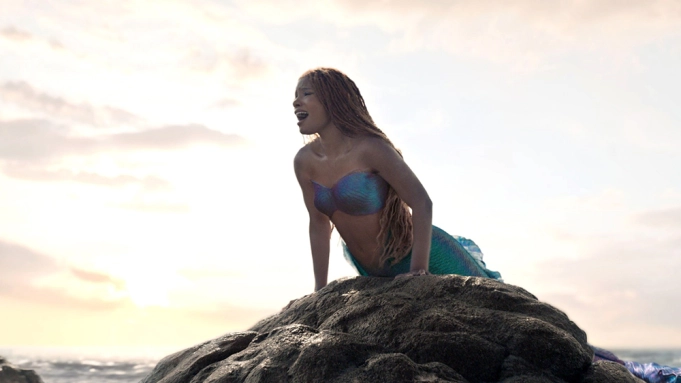
Ariel’s story has one major positive change in that she’s still a 16 year old, and the non-consensual kiss and the love story angle remain, but her primary motivation to transform into a human being is now about actually wanting to be a part of their world, instead of a romance. But other than that, the film isn’t newly creative, although it looks extremely vibrant and the experience feels like reliving my childhood with more immersion than I could have ever imagined. Apart from that, while I adore Melissa McCarthy and cannot praise her enough for her dedication in the performance to pay homage to Divine, the lack of nuance in Ursula’s story drives me to not give the live-action The Little Mermaid film a perfect Incluvie score.
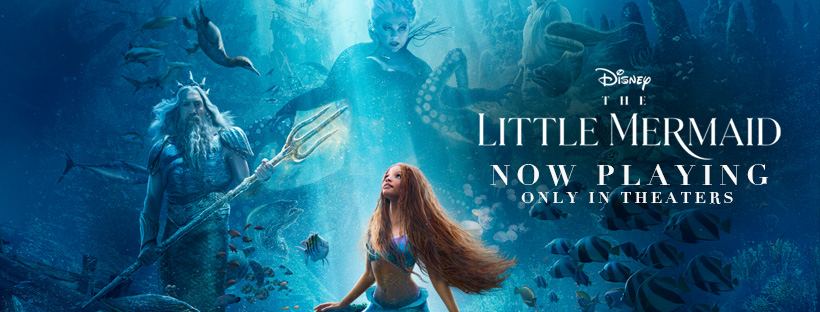
Comments